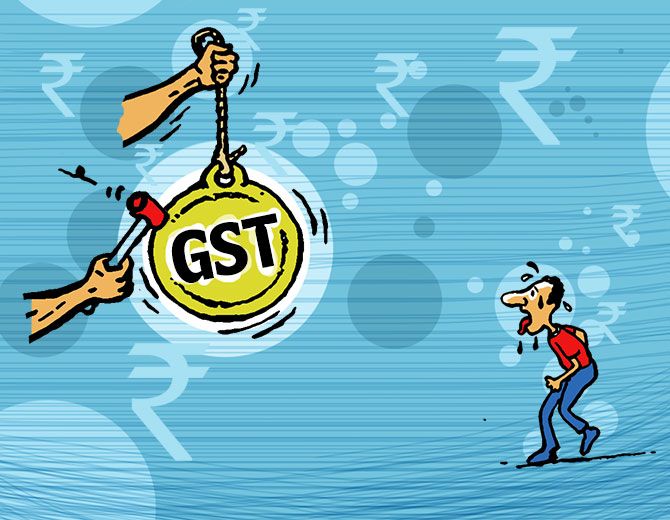The e-invoicing system will be rolled out in a phased manner from January 1 on a voluntary and trial basis, beginning with firms with a turnover of Rs 500 crore, while businesses with a turnover of Rs 100 crore or more will be required to do it from February 1.
Illustration: Dominic Xavier/Rediff.com

From April 1 next year, electronic invoicing (e-invoicing) will be mandatory for businesses with a turnover of Rs 100 crore, the government said on Thursday.
This will help curb goods and services tax (GST) evasion and make compliance easier.
The e-invoicing system will be rolled out in a phased manner from January 1 on a voluntary and trial basis, beginning with firms with a turnover of Rs 500 crore, while businesses with a turnover of Rs 100 crore or more will be required to do it from February 1.
"The basic aim behind the adoption of the e-invoice system is to facilitate convenience to the taxpayers by further simplifying the GST return system.
"Though e-invoicing the tax department would help business and taxpayers by pre-populating the returns, resulting in reducing reconciliation problems," a government release said.
There are about 7,500 GST identification numbers (GSTIN) for businesses with a turnover of Rs 500 crore and above.
From April 1, it will be voluntary for businesses with a turnover of less than Rs 100 crore.
The e-invoicing system will allow small and medium enterprises to take instant loans from banks.
"With the e-invoicing system, banks may not require a plethora of physical documents and their validation. Rather, they could do MSMEs ratings for the loan on the basis of their e-invoicing," the government release said.
The move comes at a time when the GST collections have been dismal and government is looking for ways to plug evasion.
GST collection plummeted to a 19-month low in September at Rs 91,916 crore, and remained well under the Rs 1 trillion mark for the third straight month in October at Rs 95,380 crore, 5.3 per cent lower than the corresponding month last year.
M S Mani, partner, Deloitte India said that the e-invoicing system is expected to plug input tax credit evasion loopholes and would lead to increased collections over a period of time.
"The new system will cause disruption, but we do not want complete disruption in the system, hence will start with large firms, based on their readiness.
"Small companies may not be ready for a big information technology change at this point as it will cause them huge discomfort, hence we are leaving them out" said a government official.
According to the proposed system, the companies' systems will be linked to the GSTN portal, wherin the generated invoices will be passed on to the GSTN portal within 24 hours.
E-invoicing is in works in many countries including South Kore and other Latin American countries.
As per the structure finalised by the government, an invoice will be reported to the Invoice Registration Portal (IRP) by the taxpayer, which will generate a unique Invoice reference number and digitally sign the e-invoice and sign a QR code.
"Eventually it will also do away with the need of electronic way bill requirement for those companies that opt for the system," said the official.
Pratik Jain, partner, PwC India said that introduction of this mechanism on a voluntary basis to start with, that too linked with turnover threshold, provides an opportunity to the government as well as industry to prepare for this change.
"Over a period of time, this should make the compliances easy, particularly if input credit is completely linked with E invoices.
"It would be good if large companies start using this on a voluntary basis as soon as they can."
Abhishek Jain, partner EY India said that with the system being voluntary initially and proposed phased implementation, addressal of system hiccups/load and business hassles on change also seem to well planned for.












 © 2025
© 2025